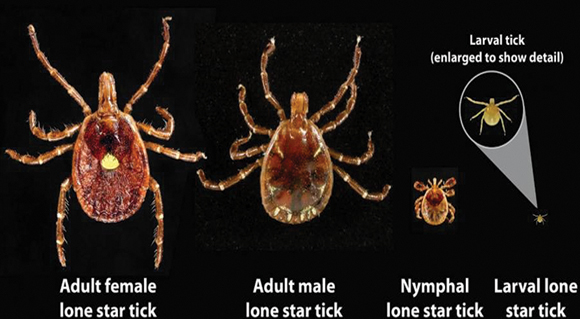We in the U.S. have our share of medical problems, but due to advances in sanitation and good hygiene we have eliminated most parasitic diseases. Unfortunately, with the explosion of the deer population, the chance of getting a parasitic disease from tick bites is becoming commonplace. Ticks can transmit diseases such as Lyme Disease and Rocky Mountain Spotted Fever. Making things even stranger, it has recently been discovered that the ticks can provoke a severe allergy to red meat!
Our story begins with drug trials for a new biologic agent for the treatment of colon cancer. During these early trials it was noted that this antibody treatment caused hypersensitivity (allergic) reactions in some volunteers. These reactions included hives and anaphylaxis. Curiously, these reactions occurred primarily to participants that lived in the southern states.
Dr. Platts-Mills and his group at the University of Virginia were asked to investigate the serous reaction to this biological treatment. They established that the reaction was an IgE response. That is to say a truly allergic reaction – not to a protein as is usually the case, but rather to a sugar component, (oligosaccharide, alpha-gal.).
The Red Meat Connection
During the same time, the Dr. Platts-Mills group evaluated a number of patients who had spent a significant time outdoors and had suddenly experienced severe allergic reactions. Many reported that the reaction occurred hours after eating red meat (beef, pork, lamb). Commercial meat extracts were negative; however on retesting to fresh meat extracts the results were strongly positive. Specific IgE blood tests for red meat were confirmatory.
Unpublished reports by allergy doctors in Georgia years earlier found 10 cases of allergy to mammalian (red) meat starting several weeks or months after a tick bite. The reaction to red meat was not typical. Many complained of nausea, diarrhea, and indigestion 2 hrs after the meal followed by itching, hives and sometimes anaphylaxis. Most patients reported that they never had a history of any allergy in the past.
These findings led the group to investigate whether IgE (allergy) antibodies to the sugar alpha-gal were present in the blood of patients reporting reactions to beef. The geographical area of reactions to the biologic treatment investigated previously and red meat allergy overlapped the southern states.
The patients’ blood showed positive results for beef, pork and lamb but not to non-mammalian meat such as turkey, chicken and fish.
The Tick Bite Connection
Suspecting a connection, the group investigated the incidence of tick bite in patents with meat allergy. Some patients showed a dramatic increase in IgE to alpha-gal from pre and post exposure to tick bites. Examination of the US Centers for Disease Control and Prevention maps of the long star tick revealed an overlap with meat allergy reports and reactions to the studied biological agent. The lone star tick is black with a white spot on its back; coincidently it is also found in the Lone Star State of Texas. Other ticks can transmit Lyme Disease and Rocky Mountain Spotted Fever but not alpha-gal allergy. It appears the tick bite may induce an allergy via its saliva and/or blood contaminated with alpha-gal from a previous recent mammalian meal. The recent increase of reported cases may be due to the burgeoning deer and tick populations with incursions into the suburbs.
The discovery of allergy to the sugar, alpha-gal, has changed the established rules of allergy. Allergy to an oligosaccharide (sugar) is possible, ticks bites can induce allergy and a severe allergy reaction can have a delayed response for up to two hours. This is a striking new example of a parasite-induced allergy.



